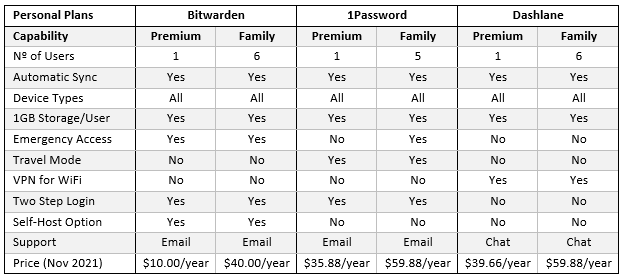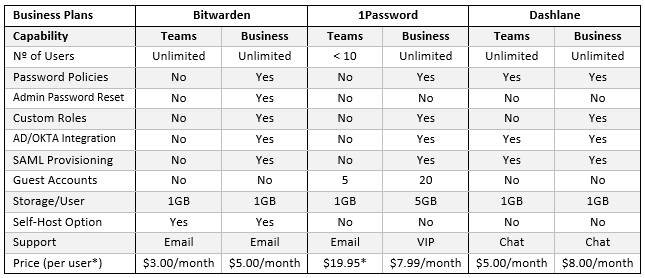To best answer the question which is more user-friendly – Bitwarden, 1Password, or Dashlane? – you have to look at the question from different perspectives. This is because someone who uses a vault-based password manager to save login credentials and autofill personal data is going to have different requirements to a business user or a system administrator.
There are several factors to consider when evaluating the best password manager for your needs. Most often the primary considerations are cost, capabilities, and security, but it is important not to overlook user-friendliness. If a password manager for personal use lacks user-friendliness, you may refrain from using it – in which case the password manager is just taking up space on your devices.
Similarly, if a password manager won´t allow you to manage personal and corporate data in the same vault, you may find you have to use one password manager for business use and another for personal use – requiring you to remember two master passwords and potentially increasing the complexity of managing login credentials, payment details, and other sensitive data.
From an administration perspective, a password manager should be easy to configure and manage. If not, system administrators may make mistakes in applying role-based access controls or password policies. Therefore, a password manager for business needs to support directory integrations, detailed event logs, and streamlined onboarding and off-boarding processes.
Which is the More User-Friendly Password Manager for Personal Use?
To start our review of which is more user-friendly – Bitwarden, 1 Password, or Dashlane? – we´ll begin by looking at the password managers and plans provided by the three vendors for personal and family use. Only two of the vendors – Bitwarden and Dashlane – provide a free service (1Password terminated its free service for new customers in 2019); and of the two, Bitwarden´s free service for personal users is far more user-friendly.
Bitwarden vs Dashlane Free Password Manager
Bitwarden´s free service for personal users allows you to sync an unlimited number of passwords across all your devices and add an extra layer of protection to sensitive accounts with two-step login. Dashlane´s free service limits you to 50 passwords on one device unless you upgrade to a “Premium” plan.
Clearly, if you access accounts requiring a login from more than one device (i.e., a PC and a smartphone), Bitwarden is the most user-friendly free password manager because you can use it on multiple devices. Although Dashlane´s free service does include a password health check and personalized security alerts, these features don´t make up for the limited accessibility.
Bitwarden vs 1Password vs Dashlane Premium Plans
The three providers´ Premium plans have many similarities, but several differences that can impact user-friendliness. For example, all three Premium plans provide users with desktop apps, mobile apps, and browser extensions for maximum availability. All provide 1GB of encrypted storage and the ability to share files and passwords securely with other people.
Beyond the shared capabilities, each password manager has its unique selling points that could prove more user-friendly depending on the individual´s needs – Bitwarden has an emergency access capability, 1Password offers users a “Travel Mode” feature, and Dashlane provides a VPN feature for when you are browsing the Internet via an unsecured WiFi service.
The individual features of the premium plans are much the same for the three vendors´ Family plans – the primary difference being that families using 1Password´s Family plan get an emergency access capability. The table below illustrates most of the differences between the three vendors. The prices reflect annual billing due to Dashlane offering discounts for advanced payment.
Notes
Some of the features included in the table require a little more explanation to determine user-friendliness. For example, although 1Password limits its Family plan to five users, additional users can be added for an extra $1 per month per user with no limit (although you are not supposed to take advantage of this option if you run a family business with 100 employees).
The emergency access capability can be crucial if you forget your master password or the hard copy where you wrote it down is lost or destroyed. Two-step login might also be an important consideration – especially for families with shared accounts – while the usefulness of 1Password´s Travel Mode and Dashlane´s VPN for WiFi will depend on where and how you browse the Internet.
One further note to mention in this section is that Bitwarden offers a free “Organization” plan for two users, which is ideal for couples requiring basic password security. The two-person plan includes the same features as the individual free plan with an additional “collections” capability so that couples can maintain private login credentials separately from shared login credentials.
Which is the More User-Friendly Password Manager for Business Use?
In the same way as Bitwarden, 1Password, and Dashlane offer a choice of plans for personal use, there is also a choice of plans for business use. All versions of the business plans build on the capabilities of the Premium personal plans, but there are wide differences between the cheaper Teams plans and the more comprehensive Business plans (called “Enterprise” plans at Bitwarden).
Determining which plan is most user-friendly will depend on how much control businesses want over password creation and use, and how granular that control needs to be. For example, Dashlane is unique in providing a policy engine in its Teams plan; but, although all three Business plans have similar management hierarchies, only Bitwarden and 1Password allow businesses to create customized management roles.
From a business users’ perspective, both of Bitwarden´s Business plans and Dashlane´s Team plan include personal premium plans for individual users, while Dashlane and 1Password throw in family accounts for each user with their fully-featured business plans. The provision of Personal and Family plans can encourage a wider adoption of better password management and online security.
Notes
The price for 1Password´s Team plan is $19.95 per month regardless of the number of users (up to a maximum of ten). The guest accounts included in 1Password´s business plans can be used to temporarily share passwords and other credentials with third parties not covered by the plans themselves – for example auditors, software engineers, etc.
Bitwarden´s self-host option is available for businesses operating in regulated industries who have to know where sensitive customer data is at all times. While it enables businesses to take control of the data, there is a substantial technical and management overhead when you self-host a password manager, as you are responsible for the security and availability of the data.
Dashlane´s chat support service is available in English, French, and German from 9:00 a.m. to 6:00 p.m. EST, Monday through Friday. Outside these hours, you will need to use email support. All three vendors provide comprehensive online Help centers (for all plans) that cover practically any issue you will encounter. Bitwarden also has a monitored Reddit thread and an online community forum.
So, Which is More User-Friendly? Bitwarden, 1Password, or Dashlane?
Unfortunately, there is no one-size-fits-all answer to this question. If you are looking for the best free password manager among the three vendors, Bitwarden is the clear winner. The race is a bit closer with regards to Premium personal and Family plans because if you do a lot of international travelling or utilize unsecured WiFi services, 1Password or Dashlane might suit you best (notwithstanding that Bitwarden is far less expensive than its two competitors).
For businesses, Dashlane´s Teams plan looks best of the three feature-limited options, but when you compare the price of Dashlane´s teams plan to Bitwarden´s fully-featured Business plan, you might as well opt for the latter to get more capabilities for the same price. Consequently, the best option can be to take advantage of the three vendors´ trial offers to evaluate their password managers in your own environment to determine which is the most user-friendly for your needs.



